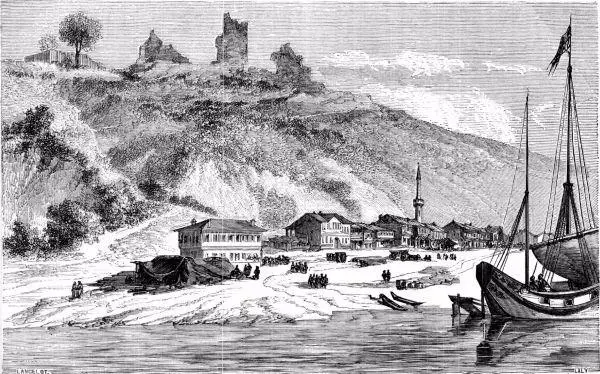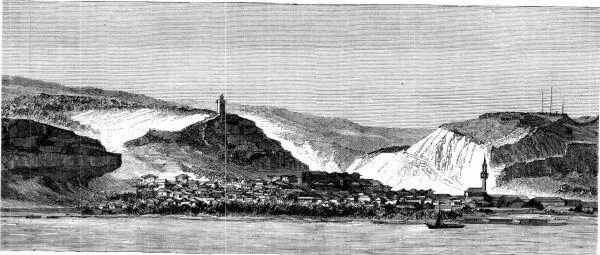Various - Lippincott's Magazine of Popular Literature and Science, Vol. 22, August, 1878
Здесь есть возможность читать онлайн «Various - Lippincott's Magazine of Popular Literature and Science, Vol. 22, August, 1878» — ознакомительный отрывок электронной книги совершенно бесплатно, а после прочтения отрывка купить полную версию. В некоторых случаях можно слушать аудио, скачать через торрент в формате fb2 и присутствует краткое содержание. Издательство: Иностранный паблик, Жанр: foreign_antique, periodic, foreign_edu, на английском языке. Описание произведения, (предисловие) а так же отзывы посетителей доступны на портале библиотеки ЛибКат.
- Название:Lippincott's Magazine of Popular Literature and Science, Vol. 22, August, 1878
- Автор:
- Издательство:Иностранный паблик
- Жанр:
- Год:неизвестен
- ISBN:нет данных
- Рейтинг книги:4 / 5. Голосов: 1
-
Избранное:Добавить в избранное
- Отзывы:
-
Ваша оценка:
- 80
- 1
- 2
- 3
- 4
- 5
Lippincott's Magazine of Popular Literature and Science, Vol. 22, August, 1878: краткое содержание, описание и аннотация
Предлагаем к чтению аннотацию, описание, краткое содержание или предисловие (зависит от того, что написал сам автор книги «Lippincott's Magazine of Popular Literature and Science, Vol. 22, August, 1878»). Если вы не нашли необходимую информацию о книге — напишите в комментариях, мы постараемся отыскать её.
Lippincott's Magazine of Popular Literature and Science, Vol. 22, August, 1878 — читать онлайн ознакомительный отрывок
Ниже представлен текст книги, разбитый по страницам. Система сохранения места последней прочитанной страницы, позволяет с удобством читать онлайн бесплатно книгу «Lippincott's Magazine of Popular Literature and Science, Vol. 22, August, 1878», без необходимости каждый раз заново искать на чём Вы остановились. Поставьте закладку, и сможете в любой момент перейти на страницу, на которой закончили чтение.
Интервал:
Закладка:
Orsova became an important point as soon as the Turks and Russians were at war. The peasants of the Banat stared as they saw long lines of travellers leaving the steamers which had come from Pesth and Bazros, and invading the two small inns, which are usually more than half empty. Englishmen, Russians, Austrian officers sent down to keep careful watch upon the land, French and Prussian, Swiss and Belgian military attachés and couriers, journalists, artists, amateur army-followers, crowded the two long streets and exhausted the market. Next came a hungry and thirsty mob of refugees from Widdin—Jews, Greeks and gypsies—and these promenaded their variegated misery on the river-banks from sunrise until sunset. Then out from Roumanian land poured thousands of wretched peasants, bare-footed, bareheaded, dying of starvation, fleeing from Turkish invasion, which, happily, never assumed large proportions. These poor people slept on the ground, content with the shelter of house-walls: they subsisted on unripe fruits and that unfailing fund of mild tobacco which every male being in all those countries invariably manages to secure. Walking abroad in Orsova was no easy task, for one was constantly compelled to step over these poor fugitives, who packed themselves into the sand at noonday, and managed for a few hours before the cool evening breezes came to forget their miseries. The vast fleet of river-steamers belonging to the Austrian company was laid up at Orsova, and dozens of captains, conversing in the liquid Slav or the graceful Italian or guttural German, were for ever seated about the doors of the little cafés smoking long cigars and quaffing beakers of the potent white wine produced in Austrian vineyards.
Opposite Orsova lie the Servian Mountains, bold, majestic, inspiring. Their noble forests and the deep ravines between them are exquisite in color when the sun flashes along their sides. A few miles below the point where the Hungarian and Roumanian territories meet the mountainous region declines into foot-hills, and then to an uninteresting plain. The Orsovan dell is the culminating point of all the beauty and grandeur of the Danubian hills. From one eminence richly laden with vineyards I looked out on a fresh April morning across a delicious valley filled with pretty farms and white cottages and ornamented by long rows of shapely poplars. Turning to the right, I saw Servia's barriers, shutting in from the cold winds the fat lands of the interior; vast hillsides dotted from point to point with peaceful villages, in the midst of which white churches with slender spires arose; and to the left the irregular line of the Roumanian peaks stood up, jagged and broken, against the horizon. Out from Orsova runs a rude highway into the rocky and savage back-country. The celebrated baths of Mehadia, the "hot springs" of the Austro-Hungarian empire, are yearly frequented by three or four thousand sufferers, who come from the European capitals to Temesvar, and are thence trundled in diligences to the water-cure. But the railway is penetrating even this far-off land, where once brigands delighted to wander, and Temesvar and Bucharest will be bound together by a daily "through-service" as regular as that between Pesth and Vienna.

SISTOVA.
I sat one evening on the balcony of the diminutive inn known as "The Hungarian Crown," watching the sunbeams on the broad current of the Danube and listening to the ripple, the plash and the gurgle of the swollen stream as it rushed impetuously against the banks. A group of Servians, in canoes light and swift as those of Indians, had made their way across the river, and were struggling vigorously to prevent the current from carrying them below a favorable landing-place. These tall, slender men, with bronzed faces and gleaming eyes, with their round skull-caps, their gaudy jackets and ornamental leggings, bore no small resemblance at a distance to certain of our North American red-skins. Each man had a long knife in his belt, and from experience I can say that a Servian knife is in itself a complete tool-chest. With its one tough and keen blade one may skin a sheep, file a saw, split wood, mend a wagon, defend one's self vigorously if need be, make a buttonhole and eat one's breakfast. No Servian who adheres to the ancient costume would consider himself dressed unless the crooked knife hung from his girdle. Although the country-side along the Danube is rough, and travellers are said to need protection among the Servian hills, I could not discover that the inhabitants wore other weapons than these useful articles of cutlery. Yet they are daring smugglers, and sometimes openly defy the Hungarian authorities when discovered. "Ah!" said Master Josef, the head-servant of the Hungarian Crown, "many a good fight have I seen in mid-stream, the boats grappled together, knives flashing, and our fellows drawing their pistols. All that, too, for a few flasks of Negotin, which is a musty red, thick wine that Heaven would forbid me to recommend to your honorable self and companions so long as I put in the cellar the pearl dew of yonder vineyards!" pointing to the vines of Orsova.
While the Servians were anxiously endeavoring to land, and seemed to be in imminent danger of upsetting, the roll of thunder was heard and a few drops of rain fell with heavy plash. Master Josef forthwith began making shutters fast and tying the curtains; "For now we shall have a wind!" quoth he. And it came. As by magic the Servian shore was blotted out, and before me I could see little save the river, which seemed transformed into a roaring and foaming ocean. The refugees, the gypsies, the Jews, the Greeks, scampered in all directions. Then tremendous echoes awoke among the hills. Peal after peal echoed and re-echoed, until it seemed as if the cliffs must crack and crumble. Sheets of rain were blown by the mischievous winds now full upon the unhappy fugitives, or now descended with seemingly crushing force on the Servians in their dancing canoes. Then came vivid lightning, brilliant and instant glances of electricity, disclosing the forests and hills for a moment, then seeming by their quick departure to render the obscurity more painful than before. The fiery darts were hurled by dozens upon the devoted trees, and the tall and graceful stems were bent like reeds before the rushing of the blast. Cold swept through the vale, and shadows seemed to follow it. Such contrast with the luminous, lovely semi-tropical afternoon, in the dreamy restfulness of which man and beast seemed settling into lethargy, was crushing. It pained and disturbed the spirit. Master Josef, who never lost an occasion to cross himself and to do a few turns on a little rosary of amber beads, came and went in a kind of dazed mood while the storm was at its height. Just as a blow was struck among the hills which seemed to make the earth quiver to its centre, the varlet approached and modestly inquired if the "honorable society"—myself and chance companions—would visit that very afternoon the famous chapel in which the crown of Hungary lies buried. I glanced curiously at him, thinking that possibly the thunder had addled his brain. "Oh, the honorable society may walk in sunshine all the way to the chapel at five o'clock," he said with an encouraging grin. "These Danube storms come and go as quickly as a Tsigane from a hen-roost. See! the thunder has stopped its howling, and there is not a wink of lightning. Even the raindrops are so few that one may almost walk between them."

NICOPOLIS.
I returned to the balcony from which the storm had driven me, and was gratified by the sight of the mountain-side studded with pearls, which a faint glow in the sky was gently touching. The Danube roared and foamed with malicious glee as the poor Servians were still whirled about on the water. But presently, through the deep gorges and along the sombre stream and over the vineyards, the rocks and the roofs of humble cottages, stole a warm breeze, followed by dazzling sunlight, which returned in mad haste to atone for the displeasure of the wind and rain. In a few moments the refugees were again afield, spreading their drenched garments on the wooden railings, and stalking about in a condition narrowly approaching nakedness. A gypsy four feet high, clad in a linen shirt and trousers so wide as to resemble petticoats, strolled thoughtlessly on the bank singing a plaintive melody, and now and then turning his brown face skyward as if to salute the sun. This child of mysterious ancestry, this wanderer from the East, this robber of roosts and cunning worker in metals, possessed nor hat nor shoes: his naked breast and his unprotected arms must suffer cold at night, yet he seemed wonderfully happy. The Jews and Greeks gave him scornful glances, which he returned with quizzical, provoking smiles. At last he threw himself down on a plank from which the generous sun was rapidly drying the rain, and, coiling up as a dog might have done, he was soon asleep.
Читать дальшеИнтервал:
Закладка:
Похожие книги на «Lippincott's Magazine of Popular Literature and Science, Vol. 22, August, 1878»
Представляем Вашему вниманию похожие книги на «Lippincott's Magazine of Popular Literature and Science, Vol. 22, August, 1878» списком для выбора. Мы отобрали схожую по названию и смыслу литературу в надежде предоставить читателям больше вариантов отыскать новые, интересные, ещё непрочитанные произведения.
Обсуждение, отзывы о книге «Lippincott's Magazine of Popular Literature and Science, Vol. 22, August, 1878» и просто собственные мнения читателей. Оставьте ваши комментарии, напишите, что Вы думаете о произведении, его смысле или главных героях. Укажите что конкретно понравилось, а что нет, и почему Вы так считаете.












